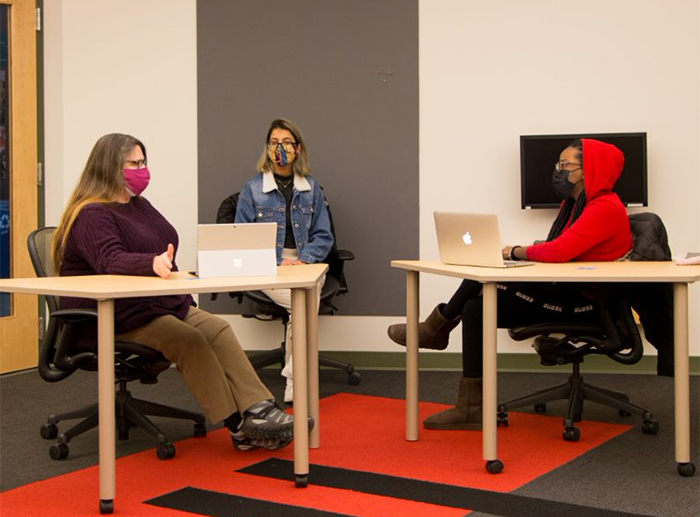Faculty-Led Program Helps Families Affected by Caregiver Substance Abuse Disorder

Sharon Kingston (far left) co-leads the Pennsylvania program for families affected by caregiver substance abuse. She's pictured above with research assistants Sagun Sharma '21 and Zori Hamilton '22. Photo by Claudia Bonaccorsi '22.
Grants support research, services in Pennsylvania, North Carolina
by MaryAlice Bitts-Jackson
Children exposed to substance abuse by parents and caregivers are at high risk of social, psychological, cognitive and behavioral issues. This makes a strong child-caregiver bond all the more important—and all the more challenging, especially for caregivers already struggling with sobriety. Add in the stresses of a global pandemic—on top of an opioid epidemic—and the need for help is clear. Especially since children of caregivers suffering from substance abuse disorder are roughly twice as likely to repeat the cycle.
But there are proven ways to rewrite this story. A Dickinson professor co-leads a program that can help strengthen caregiver-child bonds, promote effective parenting strategies and teach evidence-based intervention techniques for people who want to help.
Promoting strong bonds
Associate Professor of Psychology Sharon Kingston is a clinical community psychologist and secretary of the National Prevention Science Coalition to Improve Lives (NPSC). In late 2019, an NPSC team she co-leads was awarded grant money to support families experiencing caregiver substance abuse disorder. A $99,690 grant from the Partnership for Better Health, supports research and programs for families in Dickinson’s backyard—Cumberland County, Pennsylvania—as well as in nearby Perry and Upper Adams Counties. The other grant, funded by the Office of National Drug Control Policy through the University of Baltimore, supports research and programs for families in North Carolina.
Together, they provide caregivers with tools and strategies "to parent effectively and build a healthy relationship with a child," Kingston says. "Based on decades of research, we believe that if this happens, the children will follow a more positive trajectory and that the recovery of caregivers will be reinforced, so it’s our hope that more families will be referred to these types of programs.”
An empowering, interactive approach
Kingston co-leads the Pennsylvania program with Diana Fishbein, president and co-director of the NPSC. Program partners in Pennsylvania are the Cumberland-Perry Drug and Alcohol Commission, the Carlisle Early Education Center, the RASE Project, Hempfield Behavioral Health and Dickinson’s Center for Civic Learning & Action.
Like the North Carolina program, the Pennsylvania intervention provides several sessions of evidence-based, caregiver information and support. Caregivers are referred by local clinicians and social-services professionals. Services are provided by local practitioners who help parents reflect on the goals they’d like to achieve and help them identify and practice the strategies that help them get there.
The Pennsylvania program also includes a free family check-up, never before offered locally. It focuses on identifying family needs and on building strong social and coping skills in children. Any families with children affected by substance abuse disorder are welcome to take part.
Six Dickinson students have worked as Kingston’s research assistants on this project thus far. Prior to the COVID-19 outbreak, four additional students referred by the Center for Civic Learning & Action got involved as interns, providing trained childcare support during parent coaching sessions. After the pandemic, they developed plans for future groups. Other students in a past seminar led by Kingston helped raise awareness of related issues through research on the ways substance abuse disorder is portrayed in statewide media.
While the grant-funded, dual-state project was paused last spring to put certified COVID-19 safety precautions in place, it’s again underway. Funding has been extended to November 2021. “That’s important, because during the COVID-19 pandemic, overdose rates are up, and there’s a lot of extra stress out there,” Kingston says. “Families really need the support.”
Families can be referred to the program by calling Hempfield Behavioral Health at 717-221-8004. Professionals seeking high-quality training on these evidence-based techniques should contact Sharon Kingston at kingstos@dickinson.edu.
TAKE THE NEXT STEPS
Published February 9, 2021